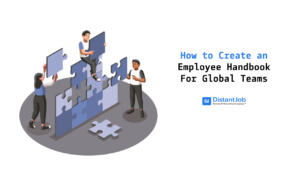Like a needle in a haystack, finding a remote worker can be pretty tricky. You’re hoping to find someone great. Someone that’s going to fill a critical role from (possibly) a great distance. A Heimdall to your Thor if you will. So why not ask the great questions? At DistantJob we have the winning formula to land yourself the digital nomad of your dreams or at least make any Asgardian proud.
How do you Interview for a Remote Job
In anticipation of the interview, an excellent way to get an idea of how your candidate will do with future communications is to have frequent (as appropriate) conversations via email and chat networks. You’ll begin to get a feel for their writing style, grammar, and reliability in communicating.
Furthermore, if the situation arises, it’s always nice to have a video chat before the actual interview which will demonstrate the candidate’s verbal communication skills.
Which brings us to the actual interview.
Even if you plan on having a mostly written relationship with your future employee, it’s always a good idea to have the interview over a video chat. While Skype and Google Hangouts are usually a popular choice, you might want to consider using GoToMeeting or Zoom. Not only are they more reliable in the technical sense, but you can record the video; an excellent option to keep for a reference should the need arise.
Interview Questions to Ask a Remote Worker
There are a lot of good questions to ask when considering a remote worker and to make it easy; we’ve broken it down into three categories: Technical Experience, Personal, and Expectations. It’s important to add your questions but here’s what we consider to be crucial to land a great worker.
Technical Experience
One of your main interview questions for a remote worker should be regarding their experience working remotely and the tools they used. There’s no point in hiring someone who is talented but doesn’t have the equipment or doesn’t like using specific tools. Despite all the benefits remote work provides, it is not for everyone. And making sure about this during interviews is fundamental.
1. How are you equipped to handle remote work?
In this instance, you want to make sure your candidate has the proper equipment to handle remote work. Basic things as having a computer, reliable Internet connection, suitable programs, adequate storage for sensitive information, (for example, remote workers who deal with patient paperwork must have a way to keep them private per HIPAA standards), a place to work, are fundamental for all remote employees.
2. Using time tracking software
Many companies prefer workers to track their time using tracking software. It’s good to make sure the candidate is familiar or at least willing to learn how to use it. However, if it’s not your case and you don’t think that monitoring your remote employees is the best solution, this same question applies to other tools. Tools you consider fundamental for your business performance that candidates should know how to use them or be willing to learn them.
3. How do you plan on staying organized?
You don’t want to hire someone that’s going to be all over the place with their tasks even if it does seem like there’s a method to the madness. Check for competence in apps such as Google Calendar, Trello or To-Do tasks lists to name a few. Whether it’s knowing what time they need to open the Bifrost or meeting a client’s deadline, you want your remote worker prepared.
4. Preferred project management tools
Most remote companies, or those who have remote employees, use project management tools to track projects and tasks. It’s good to know if candidates have used these project management tools before, if they like them or what’s their familiarity with them. Not only because you’ll know their technical experience with these tools, but you’ll also get a hint of how self-reliant they are and if they manage their time efficiently when delivering tools.
Personal
Other questions to ask remote workers during interviews is regarding their experience working in fast-changing environments. Remote work is nothing like the office, and it’s crucial to hire candidates that keep up with your company’s pace.
1. What remote experience do you have?
While this could be an obvious question, it’s crucial to gauge your potential hire’s skill level. Those who have worked outside of a traditional office beforehand have a better understanding of what to expect and what you as an employer expect. Mainly because being a remote employee is not just having the equipment and the necessary skills, but is also about being independent, adaptation, and accountability.
2. How do you deal with distractions?
Remote employees have the luxury of working from home, but it’s important to make sure they have a game plan with how to deal with distractions that come with being at home (or the local cafe, library or beach…)
3. How do you process information?
As the manager, you need to be aware of how your employee prefers to learn. Whether it’s visual or audio, big picture (the whole task explained all at once) or given in smaller tasks. Hard Refresh points out that “knowing how you process information – what you need to know when and in what format – is incredibly valuable information.”
4. Why do you want to work remotely?
It’s always good to find out the motivation for wanting to be a remote worker. Whether it’s a desire to travel, a preference to stay at home, or an inclination to work alone, it will help you get to know the candidate better. If their answer is something along the lines of doing the best work on their schedule and own terms, they could be an excellent selection. Yet, if they say their only motivation is traveling, that might be a red flag. Why? Because if you want outstanding talent, make sure that the person you’re hiring is passionate about their job. Wanting a remote job doesn’t mean a candidate will perform efficiently.
5. How do you keep yourself motivated?
Without the camaraderie of being around coworkers and in an actual office environment, the possibility of remote workers losing their motivation is possible, so make sure your candidate has a game plan for such situations.
6. Ask about a project they completed on their own.
Whether it’s an example from their personal life, work or school, it will give you a feel for how they function on their own. Note that an ideal candidate will not struggle to come up with an example.
Expectation
Remote work interview questions differ from on-site because remote employees need a different set of skills as well. They need to understand why communication matters and other aspects that are crucial for teams. During interviews, understanding how candidates think and how they solve hypothetical situations lets you know if they will be a good fit or if it’s better to keep looking for someone else.
1. How do you deal with conflictive co-workers?
Hiring for personality is important. Hard skills and technical abilities guarantee that a candidate will be able to accomplish their tasks. But soft skills and personality traits guarantee that a candidate will adapt to your culture and your team, so it’s equally important. Conflict happens in teams, and how someone reacts to it says a lot about them. If someone is reactive and explodes for little things, they will likely have a hard time working collaboratively. In comparison, someone who knows how to deal with these situations will be an excellent fit for your team.
2. Do you prefer to work within a structured environment or would you rather have things less regimented?
It’s important to find out whether or not the candidate will need to be micromanaged or not and how frequently you will need to be in contact with your company’s working nomad.
3. What would you describe miscommunication as?
Good communication is the only way remote working is successful so arguably this could be your most important question. Establishing and maintaining communication is the key to a good worker. For both remote and in-house employees. Zapier CEO Wade Foster notes that “effective communication is so key in a remote position that these little things are a sign of a person who might be a great fit.”
Switch things up a bit, and have fun! If you are looking for questions to ask a remote employee in 2020, why not get creative as well? Some companies go beyond the traditional questions with the purpose of learning more about the candidate’s reasoning/creative abilities. Some examples of fun/weird interview questions are:
‘’You’ve been given an elephant. You can’t give it away or sell it. What would you do with the elephant?” (ConnectWise)
“If you had to be shipwrecked on a deserted island, but all your human needs – such as food and water – were taken care of, what two items would you want to have with you?” (Yahoo)
“Are you a hunter or a gatherer” (Dell)
‘’How would you solve your problems if you were from Mars?” (Amazon)
DistantJob Can Guide You in Interviewing Remote Workers
How do you interview for a remote job? Most companies seeking talent have googled this question wanting direct answers. The truth is that interviews require the right questions and preparation from interviewers.
If you are still struggling to find your ideal candidate, we at DistantJob can help you! We are a Canadian remote recruitment agency, ready to help you nail the very best IT candidates for your company. Contact us today to get a jumpstart on your journey to the land of remote working!



